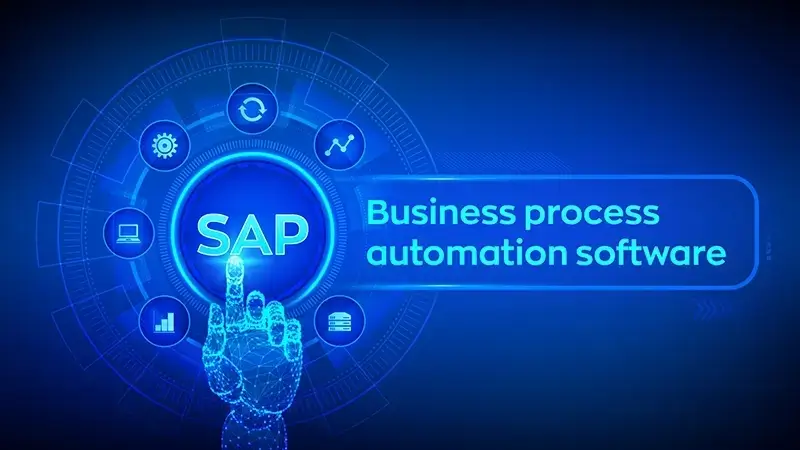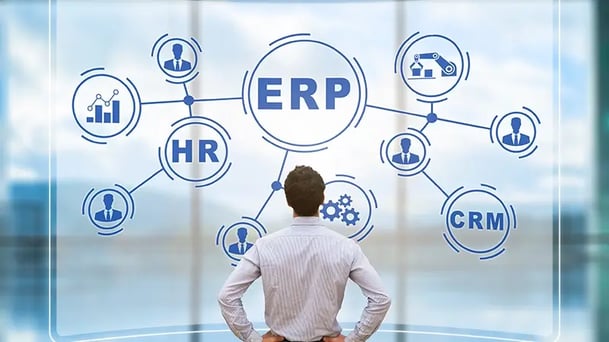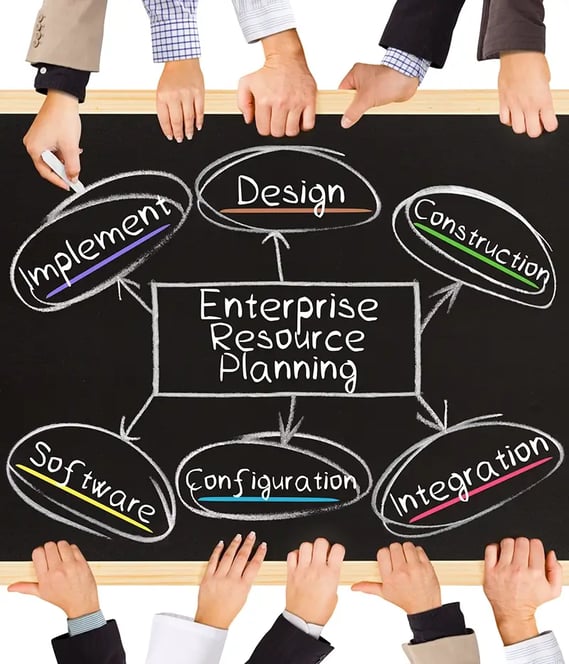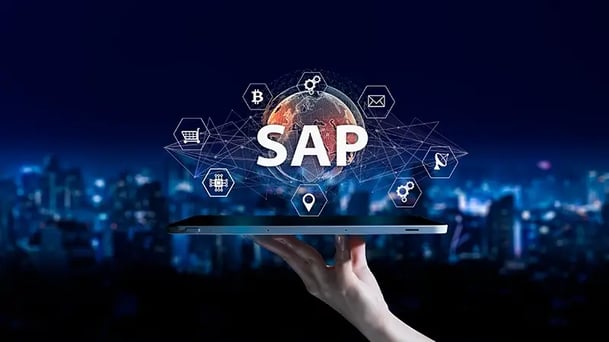SAP Business One: Features & Functionality for Your Business
SAP stands for Systems, Applications, and Products in Data Processing. SAP was developed by one of the world's largest software companies, known as...

In today's fast-paced business environment, small businesses need efficient and reliable tools to manage their operations and stay competitive. One such tool is SAP Business One, a complete and customizable solution that integrates different business processes into one platform. SAP Business One is designed specifically for small and medium-sized businesses and offers a range of features and functionalities that can help streamline operations, improve visibility, and make critical data-driven business decisions together.
In this article, we'll provide an in-depth analysis of what makes SAP Business One the software of choice, covering everything from licensing and implementation costs to its key features and benefits. So, whether you're considering implementing this ERP or simply want to learn more about what it has to offer, read on to discover why this solution is the most popular solution around the world.
SAP Business One is an enterprise resource planning (ERP) software designed for small to mid-size businesses. It provides companies with a single integrated system to manage various critical business functions, including financials, sales, purchasing and inventory control, and customer relationship management. It was launched in 2002 by the German multinational software corporation SAP SE. The software is intended to be an all-in-one solution that provides businesses with a 360 view of their operations. It can be customized to fit specific business needs and the software can be deployed on-premise or in the cloud.

SAP Business One is a complete and customizable solution that has business agility and is designed specifically for small and mid-size businesses. Here are some of the reasons why businesses should choose SAP Business One:
Scalability: The system can grow with your business. As your business expands, you can easily add new users, modules, and features to the system.
Flexibility: You can customize the system to match your specific business processes and requirements, and you can also integrate it with other software solutions.
Centralized Management: SAP ERP provides a centralized platform for managing different processes, such as finance, sales, inventory, and production.
Cost-effective: With the option of the cloud, the system has become very cost-effective.
Support: It comes with a range of support options, including online resources, user forums, and customer support.
Industry-specific features: SAP Business One offers industry-specific features for different sectors, such as retail, manufacturing, agriculture, auto dealers and professional services.
Overall, SAP Business One is a powerful and customizable solution that can help small and mid-size businesses manage their operations more efficiently and effectively. Choose SAP Business One and you will improve your business agility and profitability.

SAP Business One is a comprehensive solution that offers business agility with a wide range of features and functionalities for small to medium size businesses. Here are some of the key features that make SAP Business One a popular choice:
Financial Management: It includes features such as general ledger, accounts payable and receivable, bank reconciliation, budgeting, and financial reporting.
Sales and Customer Management: The system includes features such as sales and opportunity management, customer relationship management (CRM), marketing campaigns, and service management. The software is good for the entire sales process which will assists with all common sales employee tasks.
Inventory Management: The system includes features such as inventory tracking, inventory control, material requirements planning (MRP), warehouse management, and procurement.
Production Management: It includes features such as bill of materials (BOM), production routing, and work order management. These features help businesses manage their production processes, reduce waste, and increase efficiency.
Reporting and Analytics: It includes a range of reporting and analytics tools, including dashboards, data visualization, and predictive analytics.
Integration: SAP Business One can be easily integrated with other software solutions, such as CRM, e-commerce platforms, and business intelligence tools. The system integrates with Microsoft Office software.
The system can unify business operations and foster data collaboration to improve data accuracy.
These SAP Business One features outperform the competition, making SAP Business One ERP the software of choice.
One of the key strengths of SAP Business One is its ability to be customized to meet the unique needs of different businesses. We strongly believe that not even SAP Business One's main competitor Oracle, has the level of customization that SAP Business One offers. The system provides a large range of configurations and multiple deployment options that allow users to tailor the system to their specific processes and requirements. In addition to customization, SAP Business One also provides a complete solution that integrates different key business functions and processes into one platform.
With the new cloud version, SAP Business One has become very affordable. However, the affordability of SAP Business One depends on various factors, such as the size of the business, the number of users, and the desired functionality. While the cost of the software can be significant for businesses selling over $250 million, it is considered affordable for small and medium-sized businesses that require an advanced ERP system with robust features and capabilities.

The total cost of implementing SAP Business One depends on several factors, including the size and complexity of the business, the number of users, the type of users, and the specific modules and features required. Another factor is whether you buy a professional license or a limited license. Also, if you go the subscription and cloud route, it will cost less than buying perpetual licenses. In this section, you will learn about the costs associated with the decision that you will have to make during the buying process.

The licensing cost for SAP Business One varies depending on the number of users and the specific features required or type of license (professional licenses vs limited licenses). SAP offers both perpetual licenses and subscription licensing models. The perpetual license requires an upfront payment, while the subscription license is paid on a monthly or annual basis.
The implementation cost of SAP Business One also varies depending on the size and complexity of the business, as well as the specific modules and features required. Implementation costs typically include installation, configuration, customization, data migration and training.
In addition to licensing and implementation costs, businesses should also consider ongoing maintenance costs. You will have to pay maintenance costs for the perpetual license but not for subscription licenses.
Other factors that can affect the total cost of implementing this full ERP implementation include the need for additional hardware or software, third-party applications or integrations, human resources, on-premise installation vs on the cloud, the database SAP Hana vs Microsoft SQL and training and support costs. The cost of implementing SAP Business One can range from five hundred dollars to hundreds of thousands of dollars, depending on the size and complexity of the business.
There are two main licensing options available for SAP Business One and the cost of each license type depends on the number of users, modules required, and support level chosen by the entire organization.
SAP Business One Professional license offers complete access to all native modules and features, including the Software Development Kit (SDK) for customizing and expanding the software. Small businesses usually need fewer professional licenses and more limited licenses.
For users that require limited access, the SAP B1 Limited license grants access to three functional areas: CRM, Financial Management, and Logistics.
There are two options for obtaining Professional and Limited licenses:
Perpetual software license: Pay a one-time fee per named user for the software and an annual maintenance fee of 20% of the original cost.
Subscription: Pay a monthly fee per user and do not incur any additional maintenance costs.
Other SAP Business One license types to consider include the SAP Business One Starter Package for businesses that need fewer than five users, Mobile App licenses for mobile devices and for field workers, and third-party integration licenses for companies that need to connect third-party software applications to SAP data. There is no cost for connecting the software with Microsoft office software.

Some implementation costs to consider include:
Installation: The installation of the application takes planning and knowledge. It pays to use an experienced SAP Business One partner to minimize future problems.
On-premise installation vs on-cloud installation.
Database: SAP Hana vs Microsoft SQL server.
Configuration: This involves setting up the system to match your specific business activities and requirements.
Customization: the main advantage of SAP Business One over its competitors is the system flexibility to be configured to meet the needs of your business.
Data migration: If you're migrating from a legacy system, there may be costs involved in transferring your data to the system.
Training: Proper training is essential for maximizing the benefits of SAP software. Training costs can vary depending on the level of training required and the number of users.
The cost of implementing SAP Business One depends on the number of users, the type of users (professional or limited), as well as the complexity of the business, the entire sales process and implementation.

It is important to notice that you will not pay maintenance costs if you choose to go the route of the cloud with a subscription model. You will only pay maintenance fees if you buy the perpetual licenses. The cost of maintenance for perpetual licenses is 20% of the original cost. Since most new implementations are done in the cloud and most people are buying cloud licenses, you should not worry about the maintenance cost because this cost will be included in your monthly fees. Usually, the service contracts include all your service calls.
Implementing SAP Business One cloud system on the cloud offers several benefits for businesses, including reduced hardware and infrastructure costs, easier access to data and applications from anywhere, automatic software updates, and improved data security. Cloud SAP business systems also provide scalability, allowing businesses to easily adjust their system to meet changing demands without the need for significant capital investment. Additionally, cloud deployment can often lead to faster implementation times and quicker ROI. When you install SAP Business One cloud, you can choose between two databases: SQL or HANA. We recommend to go with the HANA database. When you use the cloud SAP Business One, you only have to worry about your internet connection.

SAP Business One is not expensive considering the benefits associated with the use of the system. Compared to other ERP solutions, SAP ERP software is reasonably priced and affordable for small and mid-sized businesses. It is important to note that while the initial investment or upfront cost may be high, the benefits of buying and implementing the software would generate a positive return on investment in the long run. A small business can benefit by using this software immediately and in the long run.

SAP Business One is a comprehensive ERP system that includes 13 core modules, each of which is designed to manage a specific aspect or customer lifecycle of a business. Here's a brief overview of each module and what it can do:
The administration module provides a central point of all the modules. You can use this module to do as follows: Specify information about your company and user information in the system, vendor, partners and more.
This module manages financial processes, such as accounts payable and receivable, general ledger, and cash management. It is a total accounting system.
This module helps businesses manage the sales process, from lead generation to closing deals. It is a marketing campaign management.
This module allows businesses to manage sales orders and track the status of each order for the entire business process.
This module manages the purchasing process, including purchase orders, purchase invoices, supply chain, purchase flow, and vendor management.
This module allows businesses to manage customer and vendor data, including contact information, payment terms, and purchase history.
This module allows businesses to manage bank transactions, including deposits, withdrawals, and bank reconciliations.
This module manages inventory levels, including stock in warehouses, production orders, and item cost. It keeps track of inventory costs.
This module manages the production process, including bill of materials, production orders, materials master data and material requirements planning.
This module helps businesses plan and manage their manufacturing operations, including materials planning and scheduling.
This module manages service calls and contracts, including service order management and warranty tracking.
The project management module manages projects, including task management, resource allocation, and budgeting.
This module manages HR processes, including employee data, time and attendance, and payroll.

This module provides reporting and analysis capabilities, allowing businesses to gain insights into their operations and make data-driven decisions. Profitable growth businesses use SAP B1 and generate integrated reports with the system.
These modules work together to provide a comprehensive ERP solution that can help businesses manage their operations more effectively. By using these modules, businesses can streamline processes, reduce manual tasks, reduce inventory costs, get real-time data, get critical business information and gain better visibility into business operations. SAP Business One is a business management software with business intelligence. The business functions of the SAP ERP software outperform the competition.
SAP Business One is a comprehensive software designed for small and mid-size businesses. It provides companies with an integrated view of their entire business operations, from financials and accounting to inventory and customer relationships. With its powerful tools for data analysis and reporting, the system allows businesses to make informed decisions and improve their overall performance. Its user-friendly interface and customizable dashboards make it easy to use and adapt to the specific needs of each business. Additionally, the SAP ERP solutions can be deployed on-premise or in the cloud, giving businesses the flexibility to choose the option that best suits their requirements.
SAP Business One is a powerful and scalable solution that is specifically designed for small to mid-size companies. Its features and customization options are tailored to meet the needs of small to medium enterprises and businesses, making it an ideal choice for companies looking to improve their operations and grow their business. These features include financial management, sales, customer management, purchasing and inventory, and reporting and analytics.

SAP Business One is an integrated management software solution that is designed to help businesses manage different business processes. The system provides a range of tools for managing finance, sales, procurement, inventory management, and more. By using SAP B1 to manage the entire business, businesses can improve their overall performance, reduce costs, and increase profitability. The system provides businesses with the tools they need to make data-driven decisions, optimize their workflows, and provide better customer service. The software is a comprehensive solution that enables businesses to focus on what they do best – growing their business.
SAP, or Systems, Applications, and Products in Data Processing is a multinational software corporation that was founded in Germany in 1972. The company is best known for its enterprise resource planning (ERP) software, which is used by businesses of all sizes to manage their operations. SAP's product offerings have evolved over the years and now include a range of software solutions, such as CRM software, supply chain management software, and more. SAP Business One is one of SAP's ERP solutions, but it is specifically designed for small and medium-sized businesses (SMBs).

One of the key features of SAP Business One is its ease of use. The system has a user-friendly interface that is easy to navigate, even for users who are not familiar with ERP systems. The system is also highly customizable, allowing users to tailor the interface to their specific needs and preferences. However, while SAP Business One is designed to be easy to use, it is still a powerful ERP system that requires proper training and support. By investing in proper training, implementation services and support, businesses can ensure that their staff are fully equipped to use and deploy SAP Business One to its full potential.

One major difference between SAP Business One and QuickBooks is the level of functionality they offer. QuickBooks is primarily a bookkeeping and accounting software, designed to help businesses manage their basic business activities. SAP Business One, on the other hand, offers a much broader range of capabilities and includes features such as inventory management, sales and purchasing, project management, and CRM.
QuickBooks is generally better suited for smaller businesses with fewer employees, while SAP Business One is designed to scale with growing businesses and financial operations that require more advanced functionality and support for larger numbers of users. Businesses looking for basic accounting software with affordable pricing may find QuickBooks to be a good fit, while growing businesses with more complex financial and operational needs may benefit from the more advanced capabilities offered by SAP Business One.

SAP Business One and Oracle NetSuite are two popular ERP systems that are designed for growing businesses. Both systems offer a wide range of business functions, including finance management, sales, purchasing, inventory, and production management. However, SAP Business One may be easier to implement and customize than Oracle NetSuite. In terms of flexibility, SAP Business One also has an advantage, as it can be highly customizable and easily integrated with other software solutions.
In terms of cost, both SAP Business One and Oracle NetSuite have variable costs depending on the features and size of the company's operations, however, SAP Business One is considered a less expensive and more cost-effective solution. In summary, both solutions are solid options for growing businesses, and the choice between SAP Business One and Oracle NetSuite will depend on the specific needs of the company.
SAP Business One can help you streamline your processes by providing a comprehensive view of your company's operations. The SAP Business One cloud offers a lot of flexibility to small businesses. With real-time data analysis and reporting, you can make informed decisions to improve efficiency, reduce costs, and increase productivity. The software's integrated modules automate repetitive tasks, reduce errors, and improve collaboration across departments, allowing you to focus on growing your business.
SAP Business One can improve your financial management and financial operations by providing real-time visibility into your financial data. The software can automate financial processes, such as accounts payable and accounts receivable, and provide accurate and timely financial reports. This helps you make informed business decisions and manage your cash flow more effectively as you gain greater insight.
SAP Business One is leading the way in the future of business management due to its ability to adapt to changing business needs and technological advancements. It provides a single integrated solution that allows companies to manage all their operations and data in one place. With SAP Business One, companies can leverage real-time analytics, automate manual processes, and gain insights into their business performance. As businesses continue to grow and evolve, SAP Business One's scalability and flexibility make it a reliable and future-proof choice for businesses of all sizes. We have seen a great increase in the implementation of SAP Business One cloud.

SAP Business One is a powerful solution that can help small businesses manage their operations more efficiently, make data-driven business decisions, and improve overall performance. With its comprehensive set of features and functionalities, customizable interface, and scalable architecture, SAP is an attractive option for businesses looking for a complete and integrated solution.
It offers small businesses a complete and customizable solution for managing their operations, from finance and sales to procurement and inventory management. With its robust functionality and real-time data access, SAP Business One can help businesses make informed decisions and improve overall performance. While the cost and complexity of implementing the system may be a barrier for some, many small businesses find that the benefits outweigh the costs and recommend SAP Business One as a worthwhile investment.
If you are looking to implement SAP Business One, we can provide you with the support and expertise necessary to ensure a successful implementation. With over 5,000 implementations and over 30 years of experience helping multinational companies with SAP implementation, our team of international consultants can provide you with the insight and guidance you need to navigate the complexities of international business operations.
Whether you need help with implementation, training, customization, or ongoing support, our SAP consultants are here to help. Contact us today to schedule a consultation at one of our SAP offices in the United States, Mexico, Guatemala, Nicaragua, El Salvador, Honduras, Costa Rica, Panama, Colombia, Chile, Argentina, Peru, Brazil, Spain, and India. We are an international top SAP partner.
We are ready for a successful engagement on this side of the world!

SAP stands for Systems, Applications, and Products in Data Processing. SAP was developed by one of the world's largest software companies, known as...

Businesses must clearly understand the different pricing and cost factors involved in implementing and maintaining SAP Business One to make an...
.webp)
An inventory adjustment initially helps to maintain precise control over stock. However, it also reduces the risk of losses and improves purchasing...